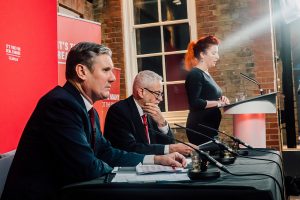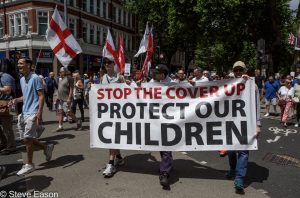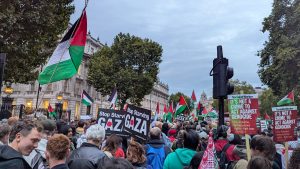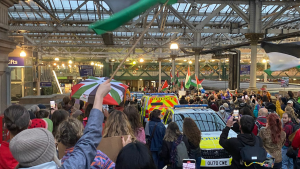
Gaza: the shifting ground of empire and resistance
TK Adisa •Palestinians in Gaza face genocide through siege, starvation and displacement. As Israel escalates its project, the cracks appearing within Western support reveal both the brutality of the moment and the urgency of resistance.
It is hard to find words that can give adequate weight to the suffering of the Palestinian people in Gaza. We are almost two whole years into a genocide, an industrialised slaughter, backed to the hilt by the US and its junior imperial partners such as Britain. The situation in Gaza now is both unfathomable in its brutality and at the same time, a bloody crystallisation of logics that have been contained within Zionism since its inception.
The Zionist death forces, supported by imperial mercenaries, are using food now as their primary instrument of genocide. Firstly, through its denial, via five months of absolute siege and the dismantling of UNRWA, and now, through the use of the Gaza Humanitarian Fund (GHF), an ‘aid’ organisation (that is in fact an instrument of genocide) to lure Palestinians in and massacre them. Palestinians in Gaza born as refugees and repeatedly displaced, wounded, traumatised and bereaved can now only acquire food for themselves, their families, friends and communities if they make the voyage to the four sites across the whole of the Gaza strip. There, they know they will face a high chance of being killed by Israeli forces or mercenaries, in the brutal massacres that are systematic at these points. Each time ‘aid’ is given out, there is a humiliating life or death scramble for the meagre, poor quality food available, as Palestinians attempt to secure aid for themselves and those dependent on them or otherwise around them.
Israel is moving to enact a final solution on Gaza. There are plans being drawn up for the construction of a ‘humanitarian city’ – a death camp within a death camp – in Rafah, to house hundreds of thousands of Palestinians, and eventually the entirety of the remaining population, to be processed ahead of their transfer (read: ethnic cleansing) to third countries. There are ongoing conversations with African and Asian countries to receive the population of Gaza after its ethnic cleansing has been completed, including South Sudan, Somalia (and the breakaway territory, Somaliland, which is currently, perhaps tellingly, receiving growing calls for recognition from within the US establishment and on the international diplomatic stage) Ethiopia, Libya, Indonesia and more. Israel assassinated Al-Jazeera journalist Anas Al-Sharif and the entire Al-Jazeera Gaza media crew, in a clear display of their intent: they are planning to escalate the horrors, once again, to an unprecedented level.
At the same time, the images of starving children and the daily reports of massacres at aid sites have made their way into the mainstream press here in Britain, the US and other Western countries. But now something seems different: newspaper editors, news presenters and liberal celebrities are now beginning to adopt a more harsh and condemnatory tone. Alistair Campbell, who as Tony Blair’s strategist was one of the architects of Britain’s involvement in the Iraq War, has called it a genocide. Ex-GHF contractors, like Anthony Aguilar, have been interviewed on the BBC and other mainstream outlets, describing how Israeli soldiers opened fire on groups of women, children and elderly people because they were ‘moving too slowly away from the site’.
Bob Geldof appeared at the end of last month, after 22 months of silence, to say that Israel is starving children, calling the Israeli military and Netanyahu liars on Sky News. In the US, the director of J-Street, a liberal Zionist organisation that opposes BDS and smeared the encampments as antisemitic, has come out to call what is happening a genocide. And we are seeing mainstream media report more widely on the views of Israeli scholars of genocide who conclude similarly: like Omar Bartov, who previously used his supposed expertise to deny that genocide was happening until mid-2024.
But what can we make of this shift, and what does it mean for those of us struggling to end the genocide and British support for Zionism at a time when Israel is moving to complete its project of extermination in Gaza?
The shift and international politics
The images and reports emerging from Gaza are ever fewer in number as journalists continue to be murdered. But the ones coming out have become just too intolerable for sections of the ruling class. This is certainly not because they have had a moral awakening: but because people in Gaza have gone to great lengths to report, document, and share the images, and because those of us in solidarity with them have continued to ‘force’ the Palestinian issue and make it impossible for the ruling class to ignore them through every direct action, disruption and demonstration up to this point.
Practically, at the level of the state and international politics, we are seeing a move by certain powers, to recognise Palestine. France and Canada have committed to recognising a Palestinian state in September, though both have said it must be ‘demilitarised’, with Hamas barred from government. Keir Starmer has gone even lower: saying that Britain will recognise Palestine unless Israel agrees to a ceasefire, refrains from annexing settlements in the West Bank and ‘commit to a peace process that results in a two-state solution.’ This is, of course, a sick joke. Firstly on account of the conditionality attached to the ceasefire: the argument that if Israel ceases its genocidal war, Palestinians can remain without a state and without recourse rights to self-determination. Secondly, because ‘refraining from annexing settlements’ (a symbolic move given that Israel in practice governs the whole occupied West Bank regardless of its legal category as Palestinian territory) and ‘committing to a peace process’ are things which are simply never going to happen.
They did not happen 30 years ago, even after Oslo, which ceded enormous legitimacy and security to Israel by virtue of the Palestine Liberation Organisation’s (PLO) recognition of Israel’s existence and the creation of the Palestinian Authority (PA) as an authoritarian organ that collaborates with Israel. Many more settlements have emerged since Oslo and even since October 2023, and the Israeli Knesset has voted against both a two-state solution and for annexation in the last year. So it is certainly not going to happen now, when Israeli politics has shifted even further to the right.
This is just saving face, and will do nothing to stop Israel, which is plunging further and further into a status as a pariah, and yet seemingly does not care. Netanyahu is now moving to compare the moves of Macron, Starmer and Albanese to European nations appeasing Hitler in the late 1930s. This is because the arms, military co-operation and essential diplomatic support all continues. Britain is still shipping F-35 parts to Israel, and is still using RAF Akrotiri for surveillance flights over Gaza for Israel (but have now outsourced the flights to a third-party firm formally conducting them on behalf of the US).
But what these moves do represent is a fracturing within the US-led imperial bloc that has more or less been totally united in its support for the genocide up to this point. Secretary of State Marco Rubio has issued statements condemning these shifts from Western nations. Essentially, the moves are, in Richard Seymour’s words ‘a desperate effort to revive an utterly dead liberal foreign policy consensus’. They can only be understood in the context of a broader fracturing of the US-led imperial bloc: Trump’s overtures towards Putin and his moves to circumvent NATO allies to force a deal on Ukraine and condition further support or any ‘peace’ deal on the extraction of significant quantities of resources and assets from Ukraine for the US’ benefit; the imposition of large tariffs on the EU, and an increasing focus of the US on unilateral action and multilateral alliances beyond Europe and NATO as it prepares for war with China. The European nations, as the junior partners within US-led Western imperialism, find themselves stuck in a position where they have backed the genocide fully, and now want to preserve the liberal international order as they realise they are going to be treated as vassals, rather than partners, by the US as it moves towards its new imperial phase.
Beyond the region, the largest symbol of hope within the international sphere in recent months, has come from the Bogotá summit in July, a conference convened by the Hague Group, a group of countries working together to uphold international law in Palestine and to end the occupation and genocide. Here, 12 nations (Bolivia, Colombia, Cuba, Indonesia, Iraq, Libya, Malaysia, Namibia, Nicaragua, Oman, Saint Vincent and the Grenadines, South Africa, and, weeks following the conference, Turkey) agreed to implement six measures. These were regarding the shipment of arms, fuel and military equipment to Israel; preventing public institutions and funding from supporting Israeli occupation; investigating and prosecuting Israeli war criminals and supporting universal jurisdiction (the principle which means international law applies across the world, regardless of where crimes were committed). These could be meaningful measures in the long-term, but in the short-term, as long as Israel’s key allies continue to give it the military assistance, diplomatic support and trade that it needs, it will not stop.
Resistance and regional politics
Israel’s regional war has successfully weakened and deterred its adversaries across the ‘Axis of Resistance’. In Lebanon, Hezbollah has become a shell of its former self following Israel’s campaign of assassinations and terror bombing last autumn. The Lebanese government has approved a plan to disarm Hezbollah by the end of this year (though Hezbollah refuses to do so), in return for Israel’s withdrawal from its occupation of parts of the South of the country and an end to its continued bombing. The Lebanese government has begun to disarm Palestinian militias in refugee camps in the South. Syria, governed by Ahmed Al-Sharaa and the Hayat Tahrir al-Sham (HTS) militias he controls, is moving towards normalisation with Israel, and remains plagued by sectarian violence committed by both HTS militias and minorities. The interim government has been seizing weapons shipments travelling towards the Bekaa Valley, destined for Hezbollah, exacerbating the weakness of the group, as well as similarly disarming armed Palestinian groups.
Israel’s total destruction of Syrian air defence infrastructure back in December has also facilitated Israeli attacks on Iran in June. Censorship has meant that it has been difficult to assess the full impact of Iranian attacks on Israel during the war, but it is clear that there was significant damage to key military and infrastructure sites within Israel. But these have not been enough to establish real deterrence against Israel. Whilst Iran is certainly much closer to a move to acquire nuclear weapons capabilities, it received significant damage during the war, including from extensive Israeli infiltrators launching drone attacks. Given the weakening of its regional allies, principally Hezbollah, and the US bombing of its nuclear sites, it is likely to be more cautious about efforts to confront Israel given the existential threat posed by the prospect of joint US-Israeli war and regime change, which became a widespread call across the West during the war. Yemen continues to bravely resist, launching missiles and drones against Israeli-linked ships as well as attacking sites within occupied Palestine.
As for Hamas and the Palestinian resistance in Gaza, strikingly effective operations continue, though at a smaller scale than in earlier phases in the war. Undoubtedly, they have been substantially weakened and fragmented. Given the starvation, the condition of the hostages is dire, which presents a further threat to Palestinians in Gaza, as the death of the hostages would remove some of the last bits of leverage for the resistance. Israeli society remains fully supportive of the genocide, and yet equally, opposed to the continuation of the war by Israel on the basis of its hostages not being freed, and because of the damage taken by the Israeli military and reducing morale. Yet this is little use to us, when the war continues, Israeli military service refusal rates remain shockingly low, and the Israeli left and liberals against the war engage only the most milquetoast, pacifist forms of resistance and refuse to question Zionism and or even apartheid.
The situation is dire and there is no use in mincing words here. Palestinians are facing total extermination and expulsion in Gaza, which no doubt signals towards the same in the West Bank, as Netanyahu and other leading Israeli politicians and figures speak more confidently of ‘Greater Israel’ becoming a reality. The genocidal closure of the ‘Palestinian question’ is on the table. For us in Britain and across the West, if there was ever a time to take seriously the concept of ‘escalation’, in our levels of organisation, strategising, coordination and activity, and seize upon the shift in public opinion, it is now.







1 comment
Thanks for this article, confirming everything I am aware of which has contributed to my own mental health deterioration. I agree that we need to escalate against our own government in particular and what better way than if all trade union leaders called an indefinite general strike. It won’t happen. What do we do now.